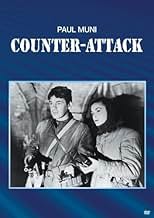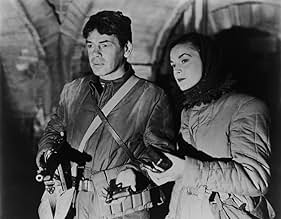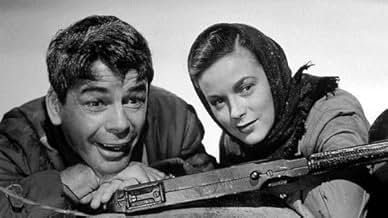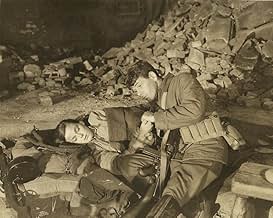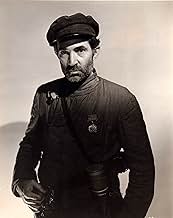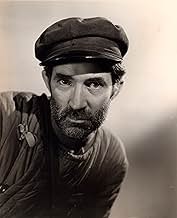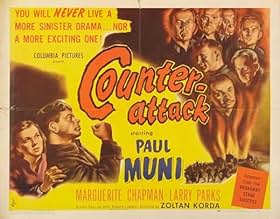अपनी भाषा में प्लॉट जोड़ेंDuring WW2, a Mexican stand-off ensues between a group of German soldiers and a team of Soviet fighters trapped together in the basement of a bombed-out Russian building.During WW2, a Mexican stand-off ensues between a group of German soldiers and a team of Soviet fighters trapped together in the basement of a bombed-out Russian building.During WW2, a Mexican stand-off ensues between a group of German soldiers and a team of Soviet fighters trapped together in the basement of a bombed-out Russian building.
Wolfgang Zilzer
- Krafft
- (as Paul Andor)
Louis V. Arco
- German Colonel
- (बिना क्रेडिट के)
John Bagni
- Paratrooper
- (बिना क्रेडिट के)
Trevor Bardette
- Petrov
- (बिना क्रेडिट के)
Richard Bartell
- Ostrovski's Assistant
- (बिना क्रेडिट के)
फ़ीचर्ड समीक्षाएं
Most of "Counter-Attack" takes place in a collapsed factory building in which 2 Russians and 7 Germans are trapped. Ordinarily, in a picture of this type, the action comes to a screeching halt and the film becomes a talkathon. But the story benefits greatly from the presence of Paul Muni, one of America's great actors, as the Russian soldier who is holding the 7 German soldiers captive until rescuers arrive.
The Russians are trying to drive the Germans from Russian soil, and have sent a handful of paratroopers ahead to gather information on troop movements, and the group is trapped after an explosion at a factory doubling as a German messaging outpost. That the film does not perish from Death by Dialogue is a tribute to Paul Muni's superior acting ability as well as an excellent script. If it comes on soon, catch it and see if you don't agree.
The Russians are trying to drive the Germans from Russian soil, and have sent a handful of paratroopers ahead to gather information on troop movements, and the group is trapped after an explosion at a factory doubling as a German messaging outpost. That the film does not perish from Death by Dialogue is a tribute to Paul Muni's superior acting ability as well as an excellent script. If it comes on soon, catch it and see if you don't agree.
I was 7 years old when I saw this movie in 1945. the war swirled around me and this was a movie about success against an enemy of America. At 7, you have no political insights as to what is going on. It's the "good guys vs. the bad guys", the "cowboys vs. the indians" from a little kids perspective, and I was for the good guys, which in this case were the Russians. I guess it was OK to root for the Russians as long as we had a common enemy. This was my first exposure to propaganda movies, but not my last. When Paul Muni and Larry parks were identified as "Commie supporters" after the war was over, they paid a price for what they believed in. With the Communist conspiracy lurking, this hysteria impacted and destroyed a lot of people, a sad day for our country. Obviously, this movie made an impact on me, as it still is one of my favorites, all politics aside. From a historical perspective, it showed, that the Russians weren't always our enemies, a fact we would rather not acknowledge today. I guess it will always hold true, that "the enemy of my enemy, is my friend".
An astringent war film atmospherically shot by Oscar-winning cameraman James Wong Howe with an attention to detail it doubtless owes to its stage origins.
As befits a film scripted by one of the Hollywood Ten, one of the Russians is a noble-looking young woman with a rifle, while the Nazis are an even more than usually devious and shifty bunch. One of the shiftiest is 'the Professor', played by Ludwig Donath, who ironically twice played fellow cast-member Larry Parks' father Cantor Yoelson before they both joined screenwriter John Howard Lawson on the blacklist.
As befits a film scripted by one of the Hollywood Ten, one of the Russians is a noble-looking young woman with a rifle, while the Nazis are an even more than usually devious and shifty bunch. One of the shiftiest is 'the Professor', played by Ludwig Donath, who ironically twice played fellow cast-member Larry Parks' father Cantor Yoelson before they both joined screenwriter John Howard Lawson on the blacklist.
After the fall of the Soviet Union in 1991, East European sources began putting World War II stories on film. And, some movies that had been made since the 1970s were being released in the West. As a result, most people in the West for the first time saw the contributions Russia had made to help win the war. These films tell stories about the war on the Eastern Front, and the ravages of war on those countries and their people. But there were some movies made much earlier in Hollywood about Russia's fighting Germany. Americans living during World War II would have seen those films. They were produced to show Americans the heroic efforts of the Russians as allies in WW II, and to win public support for the U.S. programs to supply arms and weaponry to Russia.
But, unlike other movies produced during the war years, the films on Russia's conflicts with the Germans were not shown as reruns in theaters or on TV beginning in the 1950s. No sooner had the war ended, when Joe Stalin began his power grab to control and enslave many eastern European countries and to oppress and murder his own people. Thus, the former ally in war was now an enemy in peace and a threat to western democracy. So, reruns of wartime propaganda films about the freedom-fighting Russians would conflict with the news of the day and the horrors reported on the Soviet oppression. The Cold War was on.
But now the Cold War is more than two decades behind us. With modern technology we can transfer movies from film to DVDs. And, so older films too are now available. One of the best of those is "Counter-Attack," starring Paul Muni. The movie came out in 1945 and is based on a play that ran on Broadway in 1943. A very strong point of the film is that it doesn't portray German soldiers or Russians as buffoons or as ignorant. Indeed, the dialog of the Russians in the early scenes, and of Muni throughout the film, is of intelligent, discerning individuals. While the Germans are the enemy here, none of those individuals portrayed is seen as uneducated. They do come across as menacing and clever.
The plot is excellent, and the directing and cinematography are exceptional. Muni plays his role perfectly, and several of the Germans are very good. This is a good propaganda film that put a WW II ally in good standing with Americans. If all Russians were like Muni and the rest of his special unit, we knew we had a competent, tough and capable ally. One worth fighting for and with. This movie is a welcome addition to my WW II film library.
But, unlike other movies produced during the war years, the films on Russia's conflicts with the Germans were not shown as reruns in theaters or on TV beginning in the 1950s. No sooner had the war ended, when Joe Stalin began his power grab to control and enslave many eastern European countries and to oppress and murder his own people. Thus, the former ally in war was now an enemy in peace and a threat to western democracy. So, reruns of wartime propaganda films about the freedom-fighting Russians would conflict with the news of the day and the horrors reported on the Soviet oppression. The Cold War was on.
But now the Cold War is more than two decades behind us. With modern technology we can transfer movies from film to DVDs. And, so older films too are now available. One of the best of those is "Counter-Attack," starring Paul Muni. The movie came out in 1945 and is based on a play that ran on Broadway in 1943. A very strong point of the film is that it doesn't portray German soldiers or Russians as buffoons or as ignorant. Indeed, the dialog of the Russians in the early scenes, and of Muni throughout the film, is of intelligent, discerning individuals. While the Germans are the enemy here, none of those individuals portrayed is seen as uneducated. They do come across as menacing and clever.
The plot is excellent, and the directing and cinematography are exceptional. Muni plays his role perfectly, and several of the Germans are very good. This is a good propaganda film that put a WW II ally in good standing with Americans. If all Russians were like Muni and the rest of his special unit, we knew we had a competent, tough and capable ally. One worth fighting for and with. This movie is a welcome addition to my WW II film library.
During World War II, Hollywood did something they never would have dared do before the war or only a couple years after the war...they made Pro-Soviet movies. In films such as "The North Star" and "Song of Russia", the Russian people are portrayed as noble, decent and, above all, America's friends. Why? Well, because the Soviet Union was an ally of the USA during much of the war...and the films were propaganda pieces aimed as softening the views Americans had of the USSR (which had often been very negative before this). "Counter-Attack" is another of these pro-Soviet films. Now this isn't saying it's bad...but it did serve the purpose of improving American perceptions of these allies.
The plot of this one is very simple. A pair of Russian soldiers are trapped under debris in the basement of a building...and there are about a half dozen Germans trapped with them. Alexei (Paul Muni) has gotten the drop on them...disarming them and taking them prisoner. But he cannot escape...and while they are trapped, he decides to ask these Germans questions, as he has good reason to believe that one of them is an officer in disguise as an enlisted man. But time is working against him, as he cannot sleep or they'll kill him. And, he hopes that his Russian comrades come before the Germans do to rescue them.
This film isn't as wide-eyed and saccharine as the pro-Soviet films I listed above. Instead, it's intelligent without laying the propaganda on too thickly. As a result, it's a very good film...and isn't yet another silly pro-Russian story. The only negative is that the story, at times, tends to be rather talky.
The plot of this one is very simple. A pair of Russian soldiers are trapped under debris in the basement of a building...and there are about a half dozen Germans trapped with them. Alexei (Paul Muni) has gotten the drop on them...disarming them and taking them prisoner. But he cannot escape...and while they are trapped, he decides to ask these Germans questions, as he has good reason to believe that one of them is an officer in disguise as an enlisted man. But time is working against him, as he cannot sleep or they'll kill him. And, he hopes that his Russian comrades come before the Germans do to rescue them.
This film isn't as wide-eyed and saccharine as the pro-Soviet films I listed above. Instead, it's intelligent without laying the propaganda on too thickly. As a result, it's a very good film...and isn't yet another silly pro-Russian story. The only negative is that the story, at times, tends to be rather talky.
क्या आपको पता है
- ट्रिवियाUnderwater bridges were a real Soviet Army engineering feat used in WWII. A report on such submerged bridges was published in the U.S. War Department's journal "Tactical and Technical Trends", no. 29, July 15, 1943.
- क्रेज़ी क्रेडिटOpening credits prologue: In 1942, Russia had been invaded to a depth of a thousand miles, and her armies seemed crushed. The world didn't know that these same "beaten" armies would turn, take back every foot of ground they had lost and then invade Germany itself.
One night in this same year, 1942 . . . .under cover of fog . . . .Russian engineers were engaged in a strange activity . . . .on a river, facing the German lines . . . . .
- कनेक्शनReferenced in The Way We Were (1973)
टॉप पसंद
रेटिंग देने के लिए साइन-इन करें और वैयक्तिकृत सुझावों के लिए वॉचलिस्ट करें
विवरण
- रिलीज़ की तारीख़
- कंट्री ऑफ़ ओरिजिन
- भाषा
- इस रूप में भी जाना जाता है
- One Against Seven
- फ़िल्माने की जगहें
- उत्पादन कंपनी
- IMDbPro पर और कंपनी क्रेडिट देखें
- चलने की अवधि
- 1 घं 30 मि(90 min)
- रंग
- पक्ष अनुपात
- 1.37 : 1
इस पेज में योगदान दें
किसी बदलाव का सुझाव दें या अनुपलब्ध कॉन्टेंट जोड़ें

